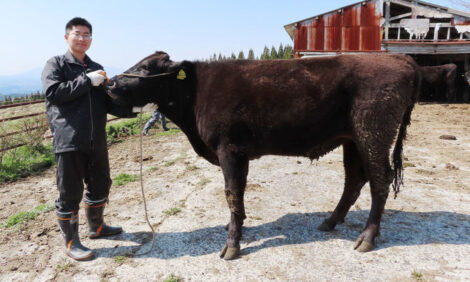



World Dairy Expo: New research shows potential of Syngenta’s Enogen corn to pay financial, sustainability dividends for dairy
Potential financial savings of $132 to $208 per milking cowEditor's note: Chris Cook, Head of Enogen with Syngenta, spoke to The Dairy Site at World Dairy Expo in Madison, Wisconsin about their new research showcasing Enogen's economic and environmental benefits.
Syngenta Seeds unveiled new research quantifying the benefits of using Enogen® corn for livestock feed in dairy operations. In addition to being a practical and scalable way for dairy producers to reduce certain environmental impacts, Syngenta found that when comparing Enogen corn to traditional feed products, a U.S. dairy farm operation could potentially yield a financial savings of $132 to $208 per milking cow.
- Enogen corn for feed supports dairy producers’ efforts to improve profitability while also aiding industry efforts to improve sustainability in dairy production
- U.S. dairy operations using Enogen could potentially save up to $208 per milking cow
- Life Cycle Assessment shows Enogen’s potential to reduce environmental impacts of farm operations based on increased feed efficiency and reduced methane intensity quantified in dairy performance studies
The financial value assessment, conducted in partnership with model developers at the University of Wisconsin-Madison’s Animal and Dairy Sciences and Agronomy Departments and Rock River Laboratory, evaluated factors such as milk content, expected milk revenue, and associated corn silage costs, resulting in a final metric of Income Over Feed Cost (IOFC).
“Confirming that Enogen isn’t just a difference-maker for environmental efficiency but for farmers’ bottom lines is significant,” said Eric Boeck, Syngenta’s Regional Director for North America Seeds. “I’ve never met a farmer who isn’t willing to innovate to make their operation more sustainable, but they also wouldn’t be doing their job if they weren’t assessing the cost involved. Knowing that Enogen can result in a win-win for them raises its ceiling as a solution for dairy producers across North America.”
Enogen corn contains an efficient alpha amylase enzyme that converts starch to usable sugars quickly, delivering more available energy to dairy cows while being easily digestible. When fed to dairy cattle as silage, Enogen corn can increase feed efficiency for dairy farmers by about 5%, which is highly significant when factoring in the millions of dairy cows in just the U.S. alone.
“When we’re searching for solutions that can move the needle across an entire industry, the impact of a new product or new technology is important, but it needs to be something producers can incorporate into their operations without too much disruption – the simpler, the better,” said Randy Shaver, Professor Emeritus at the University of Wisconsin-Madison’s Animal and Dairy Sciences Department. “When you add financial benefits of this magnitude to something that’s already able to improve feed efficiency just by changing corn hybrids, you’re going to get the attention of a lot of dairy producers.”
In addition to the financial value assessment, Syngenta Seeds conducted a life cycle assessment (LCA) for the dairy industry and unveiled a similar LCA for the beef industry in 2021, which demonstrated the potential for reducing the environmental footprint of livestock production by switching to Enogen corn in feed rations. The dairy-specific LCA, completed by sustainability firm Sustainable Solutions Corporation, highlights potential reductions in environmental impacts, including lower emissions of greenhouse gases and lower use of land, energy and water.
Specific findings show that, per 1,000 dairy cows, a farm operation could potentially yield the following savings by switching to Enogen silage:
- More than 1.4 million kg CO2e in greenhouse gas reduction, equivalent to removing 314 passenger cars from the road for one year.
- More than a 249-acre reduction in land use for growing corn, equivalent to 189 American football fields.
- More than 13 million fewer gallons of water used, enough to fill 21 Olympic-size swimming pools.
- 220,000 kWh in energy savings, enough energy to power 19 average homes for a year.
“This is an example of how a more efficient solution for the animal itself benefits every other part of a farm operation. Conducting a life cycle analysis helps to understand and quantify the benefits for the animal, the farmer, and the planet,” said Tad Radzinski, President of Sustainable Solutions Corporation.
Agriculture alone is responsible for 12% of global greenhouse gas emissions, and the whole food value chain accounts for 25% of emissions. Syngenta Seeds, as part of Syngenta Group, is committed to helping the agriculture industry reduce its carbon footprint and play a role in meeting the world’s net zero target. In June 2020, Syngenta Group announced new targets and investment objectives as part of a $2 billion commitment to help farmers address the effects of climate change and improve long-term agricultural sustainability.
Enogen corn for feed, currently available commercially in the United States and Canada, represents a significant opportunity for the agricultural industry to take meaningful steps to reduce its overall impact on the environment. Syngenta Seeds is continuing to explore possibilities to bring Enogen technology to other countries around the world while continuously investing to accelerate innovation to support farmers with more sustainable agriculture.
For more information, contact a local Golden Harvest Seed Advisor or NK retailer, or visit www.EnogenFeed.com.



